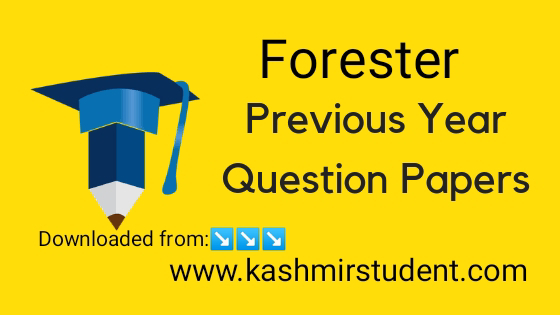Forester and Forest Guard Previous Year Paper - Download Here
Forester and Forest Guard Previous Year Paper - Download Here
Tamil Nadu Service Selection Board Forester Previous year 2020 Question paper for Multiple choice objective type written test for the posts of Forester and Forest Guard - Download Here
Tamil Nadu Service Selection Board Forester Previous year 2020 Question paper for Multiple choice objective type written test for the posts of Forester and Forest Guard - Download Here
In Section I, we will provide you detailed JKSSB Previous Syllabus for Multiple choice objective type written test for the posts of Forester and Forest protection Force Inspector (Divisional Cadre). In section II, we will provide you Tamil Nadu Service Selection Board Forester Previous year 2020 Question paper for Multiple choice objective type written test for the posts of Forester and Forest Guard. The JKSSB Forester previous year paper will be uploaded shortly. Students will be notified through the updates in the WhatsApp group.
SECTION - I | SYLLABUS
Unit-I
General English 15 marks
(I) Paragraph writing/ Comprehension
(II) Editing/ Proof Reading.
(III) Rearranging of jumbled sentences
(IV) Dialogue
(V) Narration
(VI) Models
(VII) Articles
(VIII) Paragraph writing with blanks to be filled in with the following Phrases, Pronouns, Homonyms/ homophones, Tenses.
(IX) Clauses
(X) Punctuation
(XI) Synonyms and antonyms
(XII) Pairs of words and their use in meaningful sentences.
(XIII) Idioms and phrases.
(XIV) Uses of Prepositions
Unit-II
Mathematics 10 marks
(i) Problems on finding Surface areas and volumes of combinations of any two of the following cubes, cubiods, spheres, hemispheres and right circular cylinders/ cones. Frustum of a cone.
(ii) Problems involving converting one type of metalic solid into another and other mixed problems.
(iii) Profit and loss
(iv) Simple/ Compound interst.
(v) Linear equations with two variables.
(vi) Progression/ BODMAS
Unit-III
History 10 marks
(i) Revolt of 1857-Causes and Effects.
(ii) Rise of National Movement-Factors.
(iii) Formation of the Indian National Congress in 1885 and Role of Moderates.
(iv) Factors leading to the rise of Extremism in the Congress with special reference to the Partition of Bengal.
(v) Important dates and historical events with reference to India
(vi) Boycott and Swadeshi Movement.
(vii) Rise of Muslim League in 1906 : Cause.
(viii) Khilafat Movement and the Non-Cooperation Movement.
(ix) From Swaraj to the Independence Movement.
(x) Civil Disobedience Movement.
(xi) Quit India Movement.
(xii) Independence and Partition of India.
Unit-IV
Civics 10 marks
(i) Fundamental Rights.
(ii) Fundamental duties.
(iii) Directive Principles.
(iv) Origin of democracy.
(v) Types.
(vi) Direct democracy.
(vii) Indirect democracy.
(viii) Hindrance to democracy.
(ix) Public opinion.
(x) Representaion.
(xi) Franchise.
(xii) Secret Ballot.
(xiii) Nomination.
(xiv) Symbol.
(xv) The Campaign
(xvi) Presidential elections.
(xvii) Languages
(xviii) Cities and Villages.
(xix) The United Nations.
Unit-V
Geography 10 marks
(i) Change of Seasons/ Planets/ Solar System/ Langitude-Latitude. Types of forests (with special reference of J&K State)
(ii) Conservation and protection of forests.
(iii) National Parks and wildlife sanctuaries (Reference of J&K Sanctuaries and National Parks)
(iv) Water resources.
(v) Sources of Water ( with special reference of J&K State)
(vi) Uses of water resources.
(vii) Conservation and management of water resources.
(viii) Rainwater Harvesting.
(ix) Transport.
(x) Roads (Different routes of J&K State)
Unit-VI
General Science 15 marks
(i) Gravitation/ Heat/ Light/ Matter/ Acids/ Salts/ Elements/ Cells.
(ii) Various sources of energy; conventional sources of energy; improvement in technology for using conventional source of energy (Biomass and wind energy)
(iii) Non-conventional sources of energy (Solar energy, Energy from sea).
(iv) Physical properties of metals and non-metals.
(v) Chemical properties of metals like action of water, air, acids, salts; Reactivity series of metals.
(vi) Occurance of metals; their extraction, enrichment of ores. Extraction of metals in accordance with activity series; refining of metals.
(vii) What are life processes?
(viii) Nutrition- Autotrophic Nutrition, Heterotrophic Nutrition. How do animals obtain their nutrition? Nutrition in Human beings.
(ix) Respiration.
(x) Transportation : Transportation in Plants.
(xi) Excretion : Excretion in Human beings, Excretion in Plants.
(xii) What happens when we add our waste to the Environment.
(xiii) Ecosystem – What are its components? Food chains and Webs.
(xiv) How do our activities effect the environment? Ozone layer and how it is getting depleted. Managing the garbage we produce.
Unit-VII
General Knowledge and Current Affairs 15 marks
Abbreviations, Important Dates, First in World, First in India, Popular Personalities, Geographical Discoveries, Books and Authors, Principal Languages of India, Capitals and Currencies of Countries, United Nations Organisation, Members of United Nations Organisation (UNO), Other International Organisations and Groups, Space Programme of India, India’s Automatic Research, Awards, Honours and Prizes, The World of Sports, Climate and Crops, Democracy and Democratic Institutions, Seven Wonders. Revolt of 1857-Causes and Effects, Rise of National Movement-Factors, Boycott and Swadeshi Movement, Khilafat Movement and the NonCooperation Movement, Civil Disobedience Movement, Quit India Movement, Independence and Partition of India, Origin of democracy, Franchise, Secret Ballot, Candidates, Nomination, Symbol, The Campaign, The majority, Presidential elections, Languages, Cities and Villages, Water resources, Sources of Water (with special reference of J&K State), Uses of Water resources.
Unit-VIII
General Knowledge with special reference to J&K 15 marks
(I) Abbrevations, Important dates, popular names of personalities and their achievements/ contribution.
(II) Constitution of J&K.
(III) Centre-State relationship.
(IV) Weather, Climate, Crops, Means of Transport.
(V) Important projects and their impact on State Economy.
(VI) Rivers and Lakes.
(VII) Important Tourist Destinations.
(VIII) History of J&K State/ Historical places and their importance.
NOTE:- For Units II to VII, the questions will be of Matric Standard.
SECTION - II | TNSSB PREVIOUS YEAR FORESTER PAPER
Click below on the link to Download Previous Year Forester Paper







